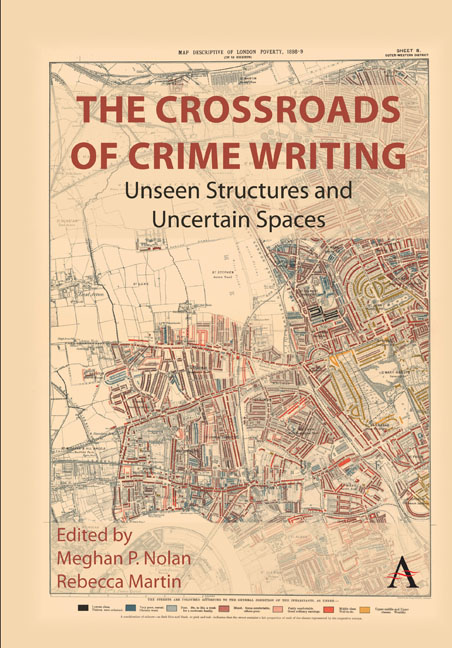Book contents
- Frontmatter
- Contents
- Introduction
- Unseen Structures
- Chapter 1 Unseen Structures and the Outlaw: Depictions of Violations in Stieg Larsson’s Millennium Trilogy
- Chapter 2 Dark Waters: Eco-Noir in New York 2140
- Chapter 3 Between Lenin and Sherlock Holmes: Soviet Militsiya Procedural in Volodymyr Kashin’s Detective Fiction
- Chapter 4 Detecting Justice: Black Crime Fiction and the Novels of Attica Locke
- Chapter 5 The Police and the Private Eye: The Making of Gendered and Racial Peripheralization in the Crime Fiction of Valerie Wilson Wesley
- Uncertain Spaces
- Chapter 6 Navigating the Carceral City: Calcutta in Late Nineteenth-Century Narratives of Detection
- Chapter 7 Traversing the Borders of Poverty and Morality: The Intersection of Maps and Upper-Class Ethics in Anne Perry’s Neo-Victorian Series
- Chapter 8 Facts and Fictions: The Liminal Space Between True Crime and Crime Fiction
- Chapter 9 The Success(Ion) and Corruption of Crime Genres in Jo Nesbø’s Macbeth (2018)
- Chapter 10 The Golden Age Meets the Age of Aquarius: Agatha Christie in the 1960s
- Notes on Editors and Contributors
- Permissions
- Index
Chapter 4 - Detecting Justice: Black Crime Fiction and the Novels of Attica Locke
Published online by Cambridge University Press: 13 April 2024
- Frontmatter
- Contents
- Introduction
- Unseen Structures
- Chapter 1 Unseen Structures and the Outlaw: Depictions of Violations in Stieg Larsson’s Millennium Trilogy
- Chapter 2 Dark Waters: Eco-Noir in New York 2140
- Chapter 3 Between Lenin and Sherlock Holmes: Soviet Militsiya Procedural in Volodymyr Kashin’s Detective Fiction
- Chapter 4 Detecting Justice: Black Crime Fiction and the Novels of Attica Locke
- Chapter 5 The Police and the Private Eye: The Making of Gendered and Racial Peripheralization in the Crime Fiction of Valerie Wilson Wesley
- Uncertain Spaces
- Chapter 6 Navigating the Carceral City: Calcutta in Late Nineteenth-Century Narratives of Detection
- Chapter 7 Traversing the Borders of Poverty and Morality: The Intersection of Maps and Upper-Class Ethics in Anne Perry’s Neo-Victorian Series
- Chapter 8 Facts and Fictions: The Liminal Space Between True Crime and Crime Fiction
- Chapter 9 The Success(Ion) and Corruption of Crime Genres in Jo Nesbø’s Macbeth (2018)
- Chapter 10 The Golden Age Meets the Age of Aquarius: Agatha Christie in the 1960s
- Notes on Editors and Contributors
- Permissions
- Index
Summary
Introduction
Images of Black people have always been integral parts of the American popular imagination. Literature, song, drama, and other media from the eighteenth century and into the present have widely reproduced and distrib-uted an American popular image of Black identity. This image exists in a world of popular culture, an uncertain space that cultural theorist Stuart Hall describes as a “contradictory space […] of strategic contestation” where group and individual identities are shaped and disputed (Hall 1996, 470). In a similar fashion, Astrid Erll describes how contested popular spaces are influenced by a broad “media of cultural memory” that can “generate and mold images of the past which will be retained by whole generations” (2008, 389). For both of these theorists, popular culture and media are not transparent conveyors of meaning but are instead makers of meaning that shape our perceptions of individuals and communities; the image of Blackness created in American popular culture is both an indicator and influencer of real lived Black experiences. In texts that engage with the unseen structures associated with popular concepts of Black identity, crime imagery often brings this contest of meaning to the surface; in many popular American texts from the slave era through the present, there is a persistent association of Blackness with images of crime and criminality, an association often used to justify the enslavement, incarceration, and impoverishment of Black communities (Fig. 4.1). The development of Black crime fiction as a literary genre in the United States is of note, therefore, because of the long history and influence of explicitly anti-Black popular culture texts that associated images of Black people with images of criminality. How can crime fiction narratives by Black authors that depend upon and emphasize the retelling of criminal acts add to or transform this Black popular image? How can crime fiction narratives that rely upon generic similarity, simultaneously resist generic tendencies toward stereotype?
The recent work of crime novelist Attica Locke provides some compelling answers to these questions. Two of her novels, Black Water Rising (2009) and Pleasantville (2015), both enliven and develop a contemporary discourse on crime writing and Black experience that begins at the start of the twentieth century.
- Type
- Chapter
- Information
- The Crossroads of Crime WritingUnseen Structures and Uncertain Spaces, pp. 81 - 102Publisher: Anthem PressPrint publication year: 2024



